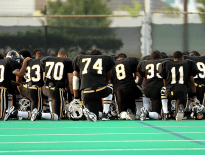
“Leftists” and Socialists, Oh My! The Politics of “Devil Terms”
AUTHOR’S NOTE: This post was originally written in 2019, which means that references to the “current head of the administration” refer to the now-former 45th president of the United States. Sadly, his unhealthy use of devil terms continues in the right wing (not that that’s new–“socialism” has been a right-wing devil term since at least the 1920s–sigh), so this post still applies.
In the US State of the Union speech, the current head of the administration used the word “socialism” in an incredibly loaded way that was designed to evoke and invoke fear responses. This article reflects on this kind of usage of “devil terms” like “leftist” and “socialism” from a communication perspective, helping us to look at these words as justly as possible.
The Wizard of Oz and Fear of Predators
I grew up in the era when The Wizard of Oz showed up on TV annually. As a result, the phrase “Lions and tigers and bears, oh my” was a common refrain that soaked its way into my bones.
It wasn’t until just now, though, that I connected that refrain to the ways “liberals” and “socialism” have been used as “devil terms.”
Stay with me while I explain, if you will. It will only take a few minutes to get there, I promise. Thanks for your patience.
“God Terms” and “Devil Terms”
First, let me explain what a “devil term” is. In studies of rhetoric, communication scholars discuss both “god terms” and “devil terms” as terms that are often used to stoke the most extreme reverence or the most extreme fear in the heart of an audience. In the terms we’ve been discussing on this blog about the neurobiology of morality, they evoke either extreme moral purity or moral-political disgusts.
Note that unlike the scholar who started the theory (Kenneth Burke), contemporary rhetorical scholars don’t actually associate god and devil terms with religion or spirituality. Still, though, the use of religious language is evocative. Certainly, those who use them for propagandistic purposes are often seeking to exploit the same neurobiological mechanisms as religious purity language does.
What They’re Used For
In the terms of stress research (which as we’ve discussed, looks at our responses to felt threat), devil terms specifically are associated with extreme threat, suspicion, and perceived predation. When speakers and writers use these kinds of terms from crassly manipulative motives, the purpose is usually to get us to react on a visceral level rather than thinking things through more thoroughly.
In short, propagandistic usages of these terms are the very reason terms like “rhetoric” and “politics” have taken on the tinge of “devil terms” in some people’s minds. In light of these valid concerns, I understand people’s hesitancy around the whole idea of persuasion.
At the same time, it’s unfair to assume all persuasion or rhetoric automatically uses language this way.
That said, the use of god terms and devil terms to bypass our rationality is all the more reason to discipline ourselves to enact careful critical thinking when words are used in this way.
My History with “God and Devil Terms”
In my youth, “god terms” such as “freedom” and “patriotism” were seen as idolatrous signs of “American civil religion.” This term was used to describe people as putting allegiance to America at the same level of allegiance to God.
I’ve discussed before that there were unhealthy parts of my upbringing I’ve since discarded. But this is one I still retain, albeit with shift in emphasis.
Here’s how I’ve adjusted my view: I think the form of this teaching I grew up with too often cast the ideas surrounding patriotism (as well as those of people who held other religions) unnecessarily in competition with Christian faith. This move in turn just casts these other ideas and the people that hold them as too close to devil terms—often unjustly—for my liking.
In fact, the focus on the problem with competing god terms often, in my view, distracted from fighting actually toxic behaviors and systems that marginalize, exclude, and oppress vulnerable populations.
“Christian Nice” and Distraction
This combo platter created an odd atmosphere where competition was only seen to be healthy against competing god terms and a few oddly selected devil terms (I talked about these here). These moves in turn created a lot of extra devil terms and a lot of fear of people who believed differently.
I now believe this atmosphere of fear, albeit often cloaked in soft language, made some members of the community I grew up in more susceptible to the use of political devil terms.
In my view, in dealing with these kinds of “god terms” and “devil terms” it isn’t as helpful to see them as signs of competing religions to be attacked—that gives them too much power. That doesn’t mean they don’t have power, mind you—anything that is effective at tapping into stress responses can have great power.
But I was also trained to believe that love casts out fear. And as Cornell West said in a quote I shared on our FB page this week, “Never forget that justice is what love looks like in public.”
Seeking Justice and Mercy Through Critical Thinking
So instead of turning either “god terms” or “devil terms” automatically into either sacred cows or enemies, I seek to be just in carefully interpreting them based on the most reliable evidence available to me.
To do that, I recognize that sometimes these terms can represent extreme good or extreme threat. But I believe that to be just, we need to detect our way to finding out whether what is being represented as extremely pure or impure actually is that way before giving that fear power. And part of that means distrusting the idea that all people in particular categories are as dangerous as they’re made out to be.
Which brings me back to the Wizard of Oz.
So What’s All This Have to Do with the Wizard of Oz?
 See, in the movie based on the book by L. Frank Baum, Dorothy is ripped out of Kansas by a tornado and is landed in the strange and at times frightening Land of Oz. Along the way she meets both friend and foe, and it just occurred to me that the friends she collects ALWAYS appear to be foes at first.
See, in the movie based on the book by L. Frank Baum, Dorothy is ripped out of Kansas by a tornado and is landed in the strange and at times frightening Land of Oz. Along the way she meets both friend and foe, and it just occurred to me that the friends she collects ALWAYS appear to be foes at first.
In fact, two of these friends—the Scarecrow and the Cowardly Lion—are “designed” to be “scary predators,” but are bad at their jobs.
The second of these encountered—the Cowardly Lion—is the most key of these because he actually wants to regain the courage it takes for him to actually be a scary predator to scare people. Through his adventures and friendship with Dorothy, though, he ends up realizing that courage isn’t about being a predator, but about acting in the midst of fear to fight for what’s good and just.
Detecting the Real Predators
Before they meet the Cowardly Lion, Dorothy has been warned that they may meet all sorts of fearsome things in the forest: “lions and tigers and bears.” To which she responds with the now-familiar refrain: “Lions and tigers and bears! Oh my!”
The point, of course, is that Dorothy starts out with all these stereotypes and fears of lions and tigers and bears. But then she meets an actual lion that doesn’t fit the predatory stereotypes. And as an ethical human being, she doesn’t actually keep fight the lion once she finds he’s not threatening her survival, but actually becomes his friend.
Detecting the Use of Contemporary “Devil Terms”
I wish and hope more of those who listened to the State of the Union sympathetically—those who heard that odd use of “socialism” as a devil term—would have the moral strength of Dorothy.
More than that, though—I wish they would look deeper into the ways their “moral disgusts” and fears are being stoked by the use of these terms in a wholly negative way.
Because here’s the thing: lions and tigers and bears ARE predators. In many situations, they can be quite fearsome.
But as Dorothy learned, not all of them are fearsome.
And we should take even more care with thinking over the use of “devil terms” for groups of people that are thrown out there to get us to fear them.
“Devil Terms” and Evoking Shame Responses
See, as I’ve pointed out above, “devil terms” like “socialist” are too often used to stoke the same kind of visceral stress reactions combined with moral disgust and outright fear Dorothy had been trained to have about lions and tigers and bears.
While it has many meanings, I believe the term “socialism” is often specifically used to evoke a condition of scarcity and want—the bread lines of East Germany, for instance.
This isn’t an accident—the idea of scarcity is associated with shame. Shame is an actual physiological stress reaction. When we’re in stress reactions our bodies and brains are in survival mode, willing to fight or run away or freeze in place or call our “safe people” to us.
Demonizing Those Who Are Trying to Help
Strongmen politicians unfortunately use such terms to evoke the most extreme forms of fearful circumstances. This is done in order to paint opponent positions as fearful predators (when, like the cowardly lion, they may be both safe and on the side of using what power they have toward justice and the common good).
As I’ve gestured at above, if socialism=hunger and want, then socialism=a predator. Socialism gets to be the bad guy. Too often, manipulative rhetors use these kinds of devil terms to create a common enemy so they get to be the person in the white hat rescuing people from the bad guy of want and predation.
The irony when compared to the actual current state of Democratic Socialism as practiced in the US goes deep. If you look at the actual policies and their purposes, the goals are to relieve hunger and inequality. And they do so in ways that past generations of Americans in the US recently found quite compatible with a republican democracy.
The Complexities of Actual Socialism
In reality, socialism is also a descriptive term that’s rarely implemented in a pure form in which the government owns all private material–and the self-named Democratic Socialists in the US aren’t even close to proposing such a thing. (In the same way, capitalism is never in a pure form in which there’s never a need for some government functions.Even the most libertarian person in the US has no problems with shared snowplows or road repairs.)
As I see it, the problems with most political systems that have incorporated either socialist and/or capitalistic ideas come not with these particular systems, but with the corruption that seeps its way into their implementation.
Personally, I’m up for fighting corruption and toxic systems and policies that hurt vulnerable people wherever I find them—both in government and in private systems. I’ve aligned myself with progressive groups because I see them doing the most to fight both of these kinds of corruption in the US right now.
In fact, I believe that’s what makes them a perceived threat worthy of a devil term to those arguing about big governments–because those people are both in government and have private interests in the corruption of both entities.
“Purifying” Those Who Are Trying to Harm
The problem, of course, is that those politicians who demonize “socialism” usually have created the corruption in both government and private entities at least in part themselves—and are the real culprits.
Also, the scary predator being painted is a fearful bedtime story representing only the most negative possible outcome of opposing policies and the people that hold them. The very dichotomies pitting “holy capitalism” vs. unchecked “socialist big government” often are meant to keep us fighting each other rather than uniting to focus on and fix the real problems we face–which often lie in the corruption I just mentioned.
Taking the Time to Be Just
Unfortunately, those who have been primed to fear such devil terms rarely react to them like Dorothy or the Cowardly Lion. Ideally, they would take time to look at how they actually behaved, trying to understand, empathize with, and befriend the lion/socialist who doesn’t actually live up to the fearsome picture painted for them.
I hope that some in that position will look closely, like Dorothy, before buying the hype that every policy that aligns with “leftists” is automatically scary. Because frankly, from my careful critical read of the evidence, there are much bigger problems going on on the Right than on the Left right now. That means it’s not a place of purity to remain politically “neutral” or “moderate.”
Important Note: Not Trying to Cast “The Left” as a God Term
I’ve noticed that those who tend to accept these “devil terms” often assume that I too am speaking as though “socialism” or “leftists” are “god terms” and defending them in a visceral all-or-nothing, knee-jerk fashion. Please let me assure you this isn’t so.
Those who are politically and religiously liberal can be jerks, and not all their policies are by any means perfect. BUT on the whole, I have looked at all the policies and unwrapped the rhetoric, and I’ve found their policies to fit with my view of faith and justice much better than any other perspective, which is why I’ve taken up the cause of many of these policies.
We Get Some Things Right, Though
If you have been taught to look out for the common good and wish to be just, I encourage you to join us in those aims. That doesn’t mean you have to wholly agree with us, mind you. But please join us in fighting against the toxic crap in this world that we CAN agree on.
(And maybe another time we can discuss how the early Christians seemed wayyy closer to “socialist” in their practice than anything promoted by current progressive politics in the US—and that the law God gave to Israel was actually quite “socialist” in expecting both individuals and government to look out for the stranger and those not economically benefited by the system ;).)
At any rate, go team #AssertiveSpirituality! Let’s stand up for what is right and just, keep working reasonably toward the common good. And may we not be distracted by unhealthy and manipulative use of god and devil terms along the way. Go team! I trust that we can cast aside our socialized fears to keep working for a healthier blend of justice and mercy.


6 thoughts on ““Leftists” and Socialists, Oh My! The Politics of “Devil Terms””
I had to stop. I couldn’t get past “the first two—the Scarecrow and the Cowardly Lion” mistake. In the movie (and I’m 90% sure it’s the same in the book), the order is Scarecrow first, Tin-Man second, & Lion last.
It probably doesn’t take away from your point, but it kind of undermines the credibility a bit.
Finally had time to fix this. Thanks for drawing attention to it. I agree that it isn’t the major point, but that it’s good to get it accurate.
The intellectual dissection above carries awesome power to describe the actualities of political rhetoric and to some degree of forms of governing. I enjoyed the analogy of “Lions, tigers, and bears”.
-unfortunately, this world stands as a Supracomplexity – a layered, yet interwoven tapestry of actions and reactions. To evaluate the comprehension of one human in response to one spoken sentence lies far beyond the abilities of any known mental faculty or group of such faculties. To tame that comprehension or its resultant behavior, therefore, represents a truly daunting endeavor.
-I commend you for your efforts, though I also arrive at different conclusions and thus different solutions. So dream the impossible dream? Yes, by all means, try!!
For a lot of people, it’s easier to fight against a “devil term” than it is to actually find the reality that needs to be fought against. Because with a devil term all you need to do is clutch your pearls and vilify it to others and you’re home free. With reality, well… you might have to do some hard work.
So true. And our stress responses make it difficult to pause enough to detect what’s really going on. I think this week’s article is on this, unless it morphs into something else. 😉
More relevant than ever!